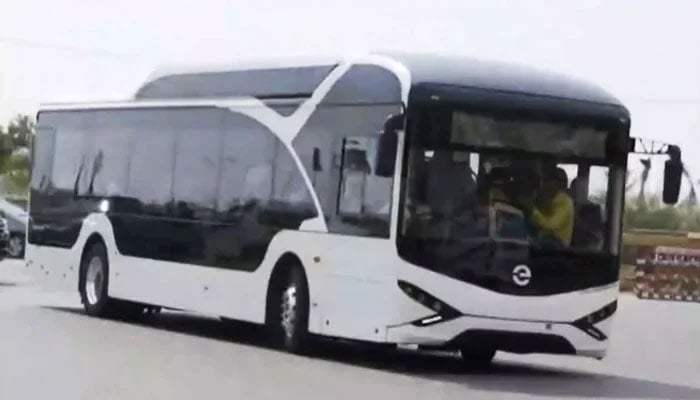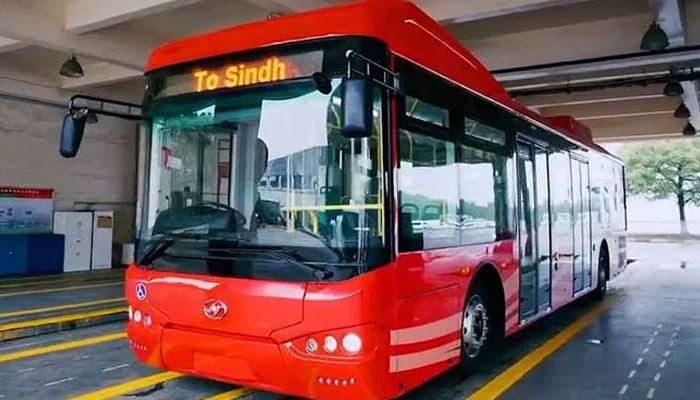Sindh govt approves 500 electric buses project for Karachi
Transport minister says work underway to procure 300 diesel-hybrid buses for five divisions
The Sindh government on Saturday greenlighted to induct 500 fully electric buses in Karachi's transportation network alongside deliberating on proposal to procure 300 hybrid-diesel buses for five divisions of the province.
The decision was taken by Sindh Chief Minister Murad Ali Shah who presided over a joint meeting of different departments to review the progress of the different projects that would be launched with the assistance of donor agencies, according to an official statement issued by the CM House on Saturday.
The meeting was held at CM House and was attended by provincial ministers Sharjeel Memon, Nasir Shah, Jam Ikram, Karachi Mayor Murtaza Wahab, Chief Secretary Asif Hyder Shah and other officials concerned.
In the meeting, the CM observed that public transport system in the Sindh capital was overwhelmed by its growing population and outdated fleet, resulting in overcrowded, inefficient, and environmentally harmful services.
He added that the induction of Peoples Bus Service, electric and Pink buses have made a difference but even then a big fleet of buses was required to resolve the public transport issue of the metropolis.
Memon told the chief minister that to tackle these challenges and promote sustainable urban mobility, his department has proposed him the induction of 500 fully electric buses into the city's transportation network.
He added that the move would enhance the commuter experience, reduce traffic congestion, and significantly lower air pollution.
CM Murad said that the transport department has started discussing the proposal with the donor agencies, and hopefully, it will secure the funds. He also directed the planning and development (P&D) and transport departments to finalise the required paperwork.
The chief minister also emphasised that the transport system across Sindh, outside of Karachi, was in dire need of modernisation and expansion to meet the growing demands of its population.
“As the province continues to develop economically and socially, the current public transport offerings struggle to keep pace,” he said.
A bus from Peoples' Bus Service stands parked at its terminal in Karachi. — X/pbsbrtsindh
The provincial transport minister said that his department was working on a proposal aiming to procure 300 diesel-hybrid buses, allocating 60 buses to each of the five divisions of Sindh, to enhance connectivity, improve environmental standards, and ensure a reliable and efficient mode of transport for all residents.
He said 60 buses would be given to each Division – Hyderabad, Sukkur, Larkana, Mirpurkhas and Shaheed Benazirabad.
Another project of procurement of 300 EV buses for intercity transportation in the province was discussed in the meeting.
Memon apprised CM Murad that the project would help connecting divisional headquarters across the province.
The Sindh chief executive said that the initiative should provide a cost-effective, safer, and environmentally friendly transport option for the public, countering the fare hikes imposed by private operators and addressing safety concerns.
Memon said that under the plan 60 EVM buses would be given to Karachi, 50 each to Hyderabad, Sukkur, Larkana and Shaheed Benazirabad and 40 to Mirpurkhas.
Regarding the Yellow Line Bus Rapid Transport (BRT), Memon said that the private operator would be offered to finance, procure, supply, operate buses and maintain various systems and provide related services.
CM Murad was told that the design of corridor was a 3rd Generation BRT. The main BRT trunk corridor comprises of 21km long dedicated corridor from Dawood Chowrangi to Numaish. The transport minister added that that the battery electric buses technology option was under consideration.
The CM directed the transport and Public-Private Partnership (PPP) unit to complete the feasibility by the end of November 2024 so that the project could be taken up.
-
Security forces gun down 30 terrorists in multiple IBOs in KP: ISPR
-
MQM-P calls for new province in Sindh
-
US report validates Pakistan military edge over India: PM
-
Banned TTP poses serious threat to Pakistan security: UNSC panel
-
CM Afridi clarifies remarks on by-poll after ECP requests army deployment
-
Dubai sees 3.2m Pakistani passengers in 2025 as airport sets new milestone
-
Security forces kill 23 Indian proxy terrorists in KP's Kurram
-
Pakistan to construct island to boost oil exploration: report













